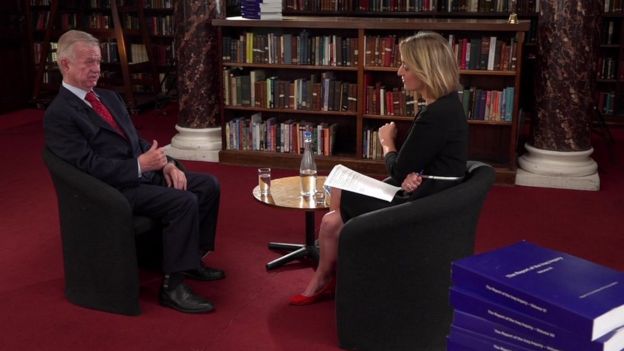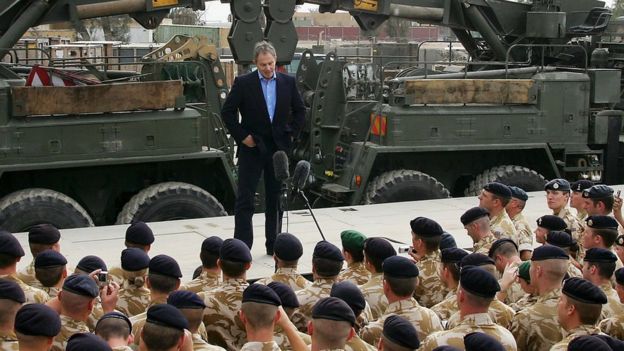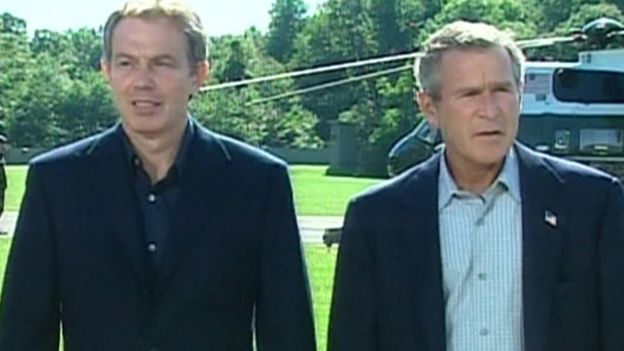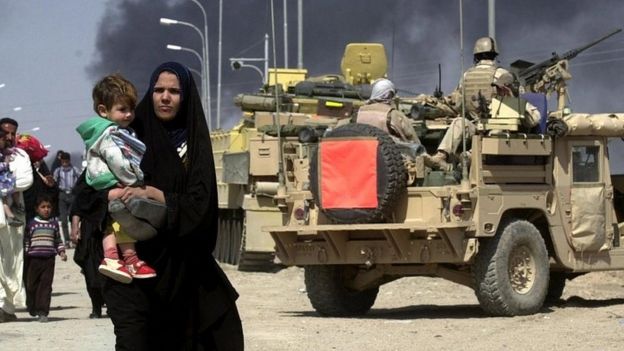Tony Blair was not "straight with the nation" about his decisions in the run up to the Iraq War, the chairman of the inquiry into the war has told the BBC.
Speaking for the first time since publishing his report a year ago, Sir John Chilcot discussed why he thinks the former PM made those decisions.
He said the evidence Mr Blair gave the inquiry was "emotionally truthful" but he relied on beliefs rather than facts.
A spokesman for Mr Blair said "all these issues" had been dealt with.
In a wide-ranging, exclusive interview with the BBC's political editor Laura Kuenssberg, Sir John also talked about Mr Blair's state of mind during the inquiry and his relationship with the then US President George W Bush in the build-up to the 2003 conflict.
Sir John also admitted that at the start of the inquiry he had "no idea" how long it would take, but defended its conduct and the seven years it took to complete.
The inquiry concluded that Mr Blair overstated the threat posed by Iraq leader Saddam Hussein and the invasion was not the "last resort" action presented to Parliament, when it backed the action, and the public.
Analysis

When the inquiry finally emerged in its full two million words, in the chaotic aftermath of the EU referendum, its analysis was polite, but firmly critical of the decision-making process and behaviour of the UK government both in the run-up to, conduct of, and aftermath of one of the most controversial conflicts in British foreign policy - what many now regard as one of the UK's biggest foreign policy mistakes.
In the immediate aftermath of the inquiry itself, Sir John, a former Whitehall permanent secretary who had worked for decades at the highest level of government, declined to take further part in the debate, as his and his panels' conclusions were digested.
But in the run-up to the report's anniversary, he agreed to speak for the first time about the inquiry's conclusions, its criticisms and consequences for us all.
Asked if the former prime minister had been as straight as he could have been with the country and the inquiry, Sir John told the BBC: "Any prime minister taking a country into war has got to be straight with the nation and carry it, so far as possible, with him or her. I don't believe that was the case in the Iraq instance."
He went on: "Tony Blair is always and ever an advocate. He makes the most persuasive case he can. Not departing from the truth but persuasion is everything. Advocacy for my position, 'my Blair position'."
He said the former Labour leader gave the case for war based on his own assessment of the circumstances, saying Mr Blair made the case "pinning it on my belief, not on the fact, what the assessed intelligence said."
"You can make an argument around that, both ethical and - well, there is an ethical argument I think.'
'Emotional pressure'
Asked by the BBC whether Mr Blair gave the fullest version of events, Sir John replied: 'I think he gave an - what was - I hesitate to say this, rather but I think it was from his perspective and standpoint, emotionally truthful and I think that came out also in his press conference after the launch statement.
"I think he was under very great emotional pressure during those sessions… he was suffering. He was deeply engaged. Now in that state of mind and mood you fall back on your instinctive skill and reaction, I think."
 Image copyrightAFP
Image copyrightAFP
Sir John also talked at length about Mr Blair's relationship with the US president in the build-up to the war.
"Tony Blair made much of, at various points, the need to exert influence on American policy making," he said.
"To do that he said in terms at one point, 'I have to accept their strategic objective, regime change, in order to exert influence.' For what purpose? To get them to alter their policy? Of course not. So in effect it was a passive strategy. Just go along."
Commenting on the documentation revealed when the Iraq Inquiry was published, Sir John revealed that his first response on reading a note sent by Mr Blair to Mr Bush in 2002 in which he told him 'I shall be with you whatever', was "you mustn't say that".
His reaction was: "You're giving away far too much. You're making a binding commitment by one sovereign government to another which you can't fulfil. You're not in a position to fulfil it. I mean he didn't even know the legal position at that point."
'Coercive diplomacy'
Asked if the relationship between Mr Blair and Mr Bush was appropriate, Sir John says the former prime minister was running "coercive diplomacy" that clashed with the settled position of the government.
"I think that the fundamental British strategy was fractured, because our formal policy, right up to the autumn of 2002 was one of containment. That was the concluded decision of cabinet.
 Image copyrightPA
Image copyrightPA"But the prime minister was running one of coercive diplomacy. With the knowledge and support of the foreign secretary, but the foreign secretary hoped that diplomacy would win and not coercion. I think to the prime minister it probably looked the other way round.".
Speaking after the publication of the Iraq Inquiry report last year, Mr Blair said he felt sorrow and regret at the deaths of 179 British personnel in Iraq between 2003 and 2009 and those of countless Iraqi civilians.
He accepted the intelligence had been wrong and post-war planning had been poor.
But he insisted that he did what he thought was the "right thing" at the time and he still believed Iraq was "better off" without Saddam Hussein.
In response to Sir John's interview, a spokesman for Mr Blair said on Thursday: "All of these issues were dealt with, in detail, at the two-hour press conference following the publication of the report."


Comments